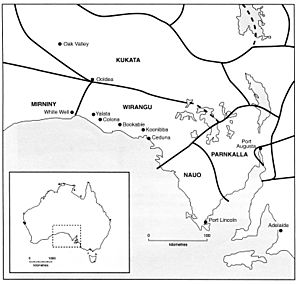Kokatha dialect facts for kids
Quick facts for kids Kokatha |
|
|---|---|
| Native to | Australia |
| Region | Western South Australia |
| Ethnicity | Kokatha |
| Native speakers | 16 (2016)e18 |
| Language family |
Pama–Nyungan
|
| AIATSIS | C3 |

|
|
The Kokatha language is an Aboriginal language from Australia. It is also known as Kukatha, Kokata, or Gugada. The Kokatha people traditionally speak this language. Their homeland is in western South Australia, north of the Wirangu people. It belongs to the Western Desert group of languages.
Contents
Where the Kokatha Language is Spoken
The Kokatha language was historically spoken in the northern western parts of South Australia.
Traditional Lands of the Kokatha People
Norman Tindale, a researcher, recorded Kokatha speakers in several places. These included Tarcoola, Kingoonya, Pimba, and McDouall Peak. They also lived west towards Ooldea and north to Stuart Range and Lake Phillipson.
When Europeans first arrived, the Kokatha people's lands seemed to be around Mount Eba. This area included land stretching to Kingoonya, Tarcoola, Coober Pedy, and possibly Ooldea.
Where Kokatha People Live Today
Today, many Kokatha people live in different towns. These include Ceduna, Koonibba, Port Augusta, and Adelaide. They also live in other places across South Australia.
Understanding Kokatha Language Groups
Kokatha is a dialect of the Western Desert language group. This means it is closely related to other dialects in that group.
Different Kokatha Dialects
It is important not to confuse Kokatha with other Western Desert dialects. For example, there are dialects called Kokatja or Kukatja dialect. These are different from the Kokatha language.
Kokatha has also been grouped with other languages from the Far West Coast. These include the Mirning and Wirangu languages.
In 1972, a linguist named John Platt wrote a grammar of the Kokatha language. He identified two types: Gugada and Gugadja. Platt thought Gugadja was more like Western Desert languages. He believed Gugada was more closely linked to Wirangu. As of 2020, the differences between these two are still being studied. However, both are still classified as Kokatha by AIATSIS.
How Languages Mix and Change
People from the Kokatha, Mirning, and Wirangu language groups lived together. They lived at Koonibba Mission starting around 1900. Because of this, many loan words (words borrowed from one language to another) moved between their languages. This happened across the whole region.
A pastor named August Hoff worked at Koonibba Mission from 1920 to 1930. He created a list of words between 1920 and 1952. His son Lothar published this list in 2004. It included words from the Wirangu, Kokatha, and Pitjantjatjara languages. This shows how languages shared words.
Keeping Kokatha Language Alive
A Kokatha woman named Dylan Coleman wrote her PhD thesis in 2010. She discussed a book by Luise Hercus about the Wirangu language. Coleman explained that the book used words from two fluent Kokatha speakers. These speakers were Coleman's grandmothers. They thought their words were helping to create a Kokatha dictionary. They believed the language they spoke was Kokatha, not Wirangu. They had learned Kokatha language and culture from Kokatha elders for many generations.
Bringing the Kokatha Language Back
The Mobile Language Team works with the Far West Language Centre in Ceduna. They research the Kokatha language. They also do other activities to help keep the language alive. This work helps new generations learn and use Kokatha.
 | Chris Smalls |
 | Fred Hampton |
 | Ralph Abernathy |

